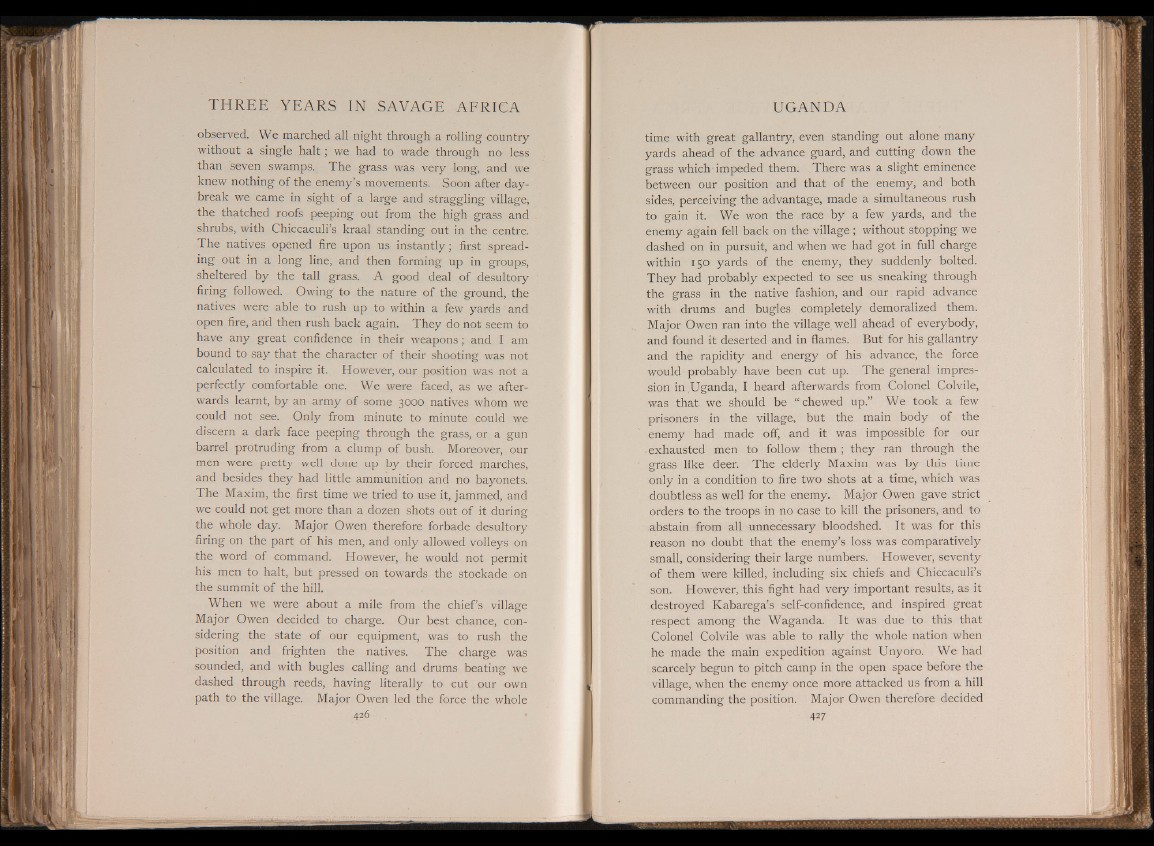
observed. We marched all night through a rolling country
without a single halt; we had to wade through no less
than seven swamps. The grass was very long, and we
knew nothing of the enemy’s movements. Soon after daybreak
we came in sight of a large and straggling village,
the thatched roofs peeping out from the high grass and
shrubs, with Chiccaculi’s kraal standing out in the centre.
The natives opened fire upon us instantly; first spreading
out in a long line, and then forming up in groups,
sheltered by the tall grass. A good deal of desultory
firing followed. Owing to the nature of the ground, the
natives were able to rush up to within a few yards ' and
open fire, and then rush back again. They do not seem to
have any great confidence in their weapons; and I am
bound to say that the character of their shooting was not
calculated to inspire it. However, our position was not a
perfectly comfortable one. We were faced, as we afterwards
learnt, by an army of some 3000 natives whom we
could not see. Only from minute to minute could we
discern a dark face peeping through the grass, or a gun
barrel protruding from a clump of bush. Moreover, our
men were pretty well done up by their forced marches,
and besides they had little ammunition and no bayonets.
The Maxim, the first time we tried to use it, jammed, and
we could not get more than a dozen shots out of it during
the whole day. Major Owen therefore forbade desultory
firing on the part of his men, and only allowed volleys on
the word of command. However, he would not permit
his men to halt, but pressed on towards the stockade on
the summit of the hill.
When we were about a mile from the chiefs village
Major Owen decided to charge. Our best chance, considering
the state of our equipment, was to rush the
position and frighten the natives. The charge was
sounded, and with bugles calling and drums beating we
dashed through reeds, having literally to cut our own
path to the village. Major Owen led the force the whole
426
time with great gallantry, even standing out alone many
yards ahead of the advance guard, and cutting down the
grass which impeded them. There was a slight eminence
between our position and that of the enemy, and both
sides, perceiving the advantage, made a simultaneous rush
to gain it. We won the race by a few yards, and the
enemy again fell back on the village ; without stopping we
dashed on in pursuit, and when we had got in full charge
within 150 yards of the enemy, they suddenly bolted.
They had probably expected to see us sneaking through
the grass in the native fashion, and our rapid advance
with drums and bugles completely demoralized them.
Major Owen ran into the village well ahead of everybody,
and found it deserted and in flames. But for his gallantry
and the rapidity and energy of his advance, the force
would probably have been cut up. The general impression
in Uganda, I heard afterwards from Colonel Colvile,
was that we should be “ chewed up.” We took a few
prisoners in the village, but the main body of the
enemy had made off, and it was impossible for our
-exhausted men to follow them ; they ran through the
grass like deer. The elderly Maxim was by this time
only in a condition to fire two shots at a time, which was
doubtless as well for the enemy. Major Owen gave strict
orders to the troops in no case to kill the prisoners, and to
abstain from all unnecessary bloodshed. It was for this
reason no doubt that the enemy’s loss was comparatively
small, considering their large numbers. However, seventy
of them were killed, including six chiefs and Chiccaculi’s
son. However, this fight had very important results, as it
destroyed Kabarega’s self-confidence, and inspired great
respect among the Waganda. It was due to this that
Colonel Colvile was able to rally the whole nation when
he made the main expedition against Unyoro. We had
scarcely begun to pitch camp in the open space before the
village, when the enemy once more attacked us from a hill
commanding the position. Major Owen therefore decided
427